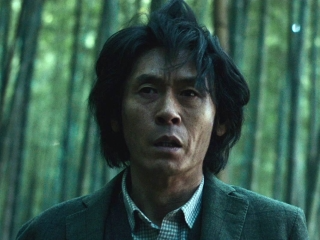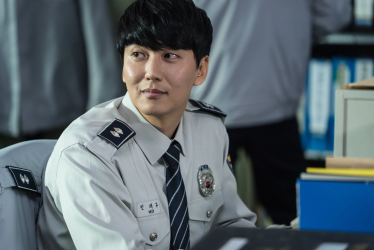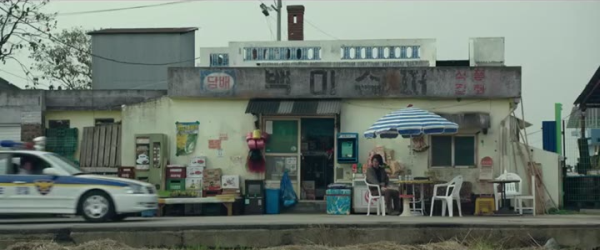I have, of late, become much less sensitive to crowds and noise, which is a real boon given the way the neighborhood’s been changing over the past decades of my life, and more directly helpful in terms of shuttling The Flower to her friend’s house which is in one of the most crowded areas of the city. I’ll drop her off and drive the five miles (it takes a good half-hour) over to Koreatown and catch a film like Warriors of the Dawn, or, in this case Memoir of a Murderer.

Dodging all the trees is the worst.
The theme of an assassin with amnesia has been done quite a bit. The first one I recall seeing was the slick Flemish film Memories of a Killer(2003), where a hitman is trying to pull One Last Job while losing his mind. Then there was Liam Neeson’s Unknown back in 2011, which has a very similar plot but is based on a French book, rather than a Belgian book. This Korean film, based on a Korean novel, has a different take on the genre. Instead of a professional assassin, our “hero” is actually a serial killer. (There’s also a Korean movie by the name of Memories of Murder by the guy who did The Host and Snowpiercer, but I don’t think that has the amnesia element.)
He’s a quasi-sympathetic, semi-retired serial killer, I suppose, having not killed anyone since a horrible car accident 17 years earlier. That accident may be the source of his current dementia, in fact, and we learn in dribs-and-drabs what happened that fateful day.
The story is fairly simple. Byung-su, a veterinarian, lives with his doting daughter, Eun-hee, who tries to get him to remember things by talking into a tape recorder, and marking time until he can no longer work. Often he goes out into a forest that he planted decades ago and where the bodies of his victims are buried. On his way back, he has an episode out on the road and rear ends a guy. A guy with Something In His Trunk. Something bloody. Although his “victim” laughs it off and says its a deer, Byung-su knows: He was a serial killer, he can spot another serial killer.

Oh, yeah. He’s a serial killer.
Perhaps surprisingly, he’s not particularly sympathetic to other serial killers. He had standards. To wit: He never killed anybody who didn’t have it coming. Though, naturally, as his career progressed, the definition of who “has it coming” got broader. (As a vet, a little animal cruelty was enough to earn you a trip to the woods, e.g., and that’s probably one of the crimes when the audience most sympathizes with Byung-Su.)
This serial killer is going after young schoolgirls, which is not OK. But when he reports to the police, they don’t do anything. First, they know he’s got The Health Problems. Second, the guy he fingered is a cop named Tae-ju. And that’s just ridiculous.
It takes Byung-su a while to report the incident in the first place because, while he records the information (realizing its import), he has an episode not long after, and is easily distracted after such an episode. Tae-ju most clearly is what Byung-su suspects him to be, and uses the old man’s memory lapses to take advantage of his situation—in particular by targeting Eun-hee. While Byung-su doesn’t generally approve of other serial killers, he really doesn’t like them dating his daughter, and often his episodes leave him kind of blank and without his serial-killer-detecting powers, leaving him to believe that Tae-ju is okay.
Sometimes.

“Remember not to murder anyone on your way home.”
So, Byung-su has a problem, which is that his normal handlings of these things involve brute force murder, and he’s about 30 years too old, to say nothing of his mental issues, to take on the young Tae-ju. There’s also the whole issue of, well, is he right about Tae-ju? What if Byung-su is the one killing the girls? He could be doing it and not remembering it, he supposes. There are substantial moments in the film where his understanding of things is shown to be tragically off-base.
There’s a flip in this movie that the kids, were they with me, would’ve called a Double Bluff Reverso (from “King of the Hill”‘s Dale Gribble). But the problem with the DBR—a twist that completely subverts your understanding of the events that have preceded—is that it usually feels like a ridiculously stupid attempt to surprise you, and invalidates everything else you’ve seen. When the movie pulls that, I was still along for the ride, but it sure made me feel like a sap.
But then!
It pulls another Double Bluff Reverso! And then everything sort of makes sense again.
I did say the story was simple, and it actually is, but the plot is very complex at times, and some folks have criticized this film for precisely that: Too much plot getting in the way of the story. I can see that; it is a bit overwrought, I suppose. But I rather liked it. There’s a subtext here about redemption and forgiveness—to the extreme to be sure—that actually made the movie work for me when things got crazy.
Or maybe I just like Korean movies. They’re kind of like Hong Kong potboilers mixed with Israeli films: Crazy action and plot but with a tremendous sense of respect for the characters mixed in. Typically good cinematography. Gripping ending. Nice denouement. If you’re in the mood for an Asian thriller, you could do worse.

Remember: “North” is the better Korea.

3 thoughts on “Memoir of a Murderer”